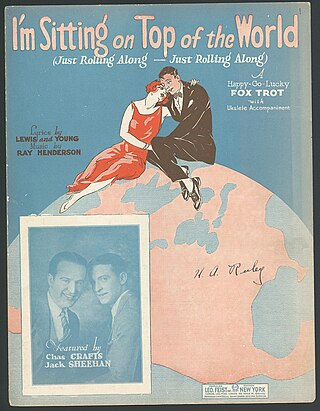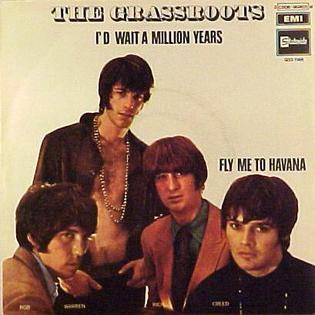Related Research Articles
"Teach Me Tonight" is a popular song that has become a jazz standard. The music was written by Gene De Paul, the lyrics by Sammy Cahn. The song was published in 1953.
"Would I Love You " is a pop song composed by Harold Spina with lyrics by Bob Russell. It was published in 1950 and covered by many different musicians.

"A Fine Romance" is a popular song composed by Jerome Kern with lyrics by Dorothy Fields, published in 1936.
"Please Don't Talk About Me When I'm Gone" is a song published in 1930. It was written by Sam H. Stept with lyrics by Sidney Clare. The original publication also credited singer Bee Palmer as co-composer.
"I Had the Craziest Dream" is a popular song which was published in 1942. The music was written by Harry Warren, the lyrics by Mack Gordon.

"I'm Sitting on Top of the World" is a popular song with music written by Ray Henderson and lyrics by Sam M. Lewis and Joe Young. It was published in 1925. This composition is not to be confused with, "Sitting on Top of the World" written by Walter Vinson and notably performed by Taj Mahal and Corey Harris.
"You're Nobody till Somebody Loves You" is a popular song written by Russ Morgan, Larry Stock, and James Cavanaugh and published in 1944. The song was first recorded by Morgan and was a hit for him in 1946, reaching the No. 14 spot in the charts. The best known version was Dean Martin's, which was released in 1960 and reissued in 1964.
"Angry" is a popular song, with music by Henry Brunies, Merritt Brunies, and Jules Cassard, composed in 1924. Lyrics by Dudley Mecum were added when the song was published in printed form in the following year,1925.
For other songs with this title, see Goodnight My Love (disambiguation)
"It's a Lovely Day Today" is a popular song written by Irving Berlin for his successful musical Call Me Madam (1950) when it was introduced by Russell Nype and Galina Talva. The musical was adapted as a movie in 1953 and the song "It's a Lovely Day Today" was performed by Donald O'Connor and Vera-Ellen.
"This Time the Dream's on Me" is a song composed by Harold Arlen, with lyrics by Johnny Mercer. It was written for the 1941 film Blues in the Night when it was sung by Priscilla Lane.
"Isn't This a Lovely Day?" is a popular song written by Irving Berlin for the 1935 film Top Hat, where it was introduced by Fred Astaire in the scene where his and Ginger Rogers' characters are caught in a gazebo during a rainstorm. The lyric is an example of a song which turns a bad situation into a love song, a common style for Irving Berlin, as in "I've Got My Love to Keep Me Warm" and "Let's Have Another Cup of Coffee".
"I Am in Love" is a 1953 popular song written by Cole Porter, for his musical Can-Can, where it was introduced by Peter Cookson.
"I Guess I'll Have to Change My Plan" is a popular song published in 1929, with music by Arthur Schwartz and lyrics by Howard Dietz.
"Just Squeeze Me " is a 1941 popular song composed by Duke Ellington, with lyrics by Lee Gaines. The song has been recorded numerous times by a number of artists in the years since, having become a jazz standard. Hit recordings have been by Paul Weston & His Orchestra and by The Four Aces.
"Please Be Kind" is a 1938 American song composed by Saul Chaplin with lyrics by Sammy Cahn. Popular recordings that year were by Mildred Bailey and the Red Norvo Orchestra; Bob Crosby & His Orchestra ; and by Benny Goodman & His Orchestra.

"(I'd) Wait a Million Years" is a 1969 hit single by The Grass Roots.
"This Year's Kisses" is a popular song written in 1936 by Irving Berlin for the musical film On the Avenue (1937) and introduced by Alice Faye. Popular recordings in 1937 were by Benny Goodman, Hal Kemp, Shep Fields and by Teddy Wilson with Billie Holiday.

Singin' & Swingin' is a 1960 album by the American jazz singer Betty Roché.
"I Never Had A Chance" is a popular song written by Irving Berlin, published in 1934. Popular versions that year were by Eddy Duchin and by Glen Gray & The Casa Loma Orchestra.
References
- ↑ Whitburn, Joel (1986). Joel Whitburn's Pop Memories 1890-1954. Menomonee Falls, Wisconsin: Record Research Inc. p. 601. ISBN 0-89820-083-0.
- ↑ "www.discogs.com". discogs.com. Retrieved May 20, 2024.
- ↑ Whitburn, Joel (1986). Joel Whitburn's Pop Memories 1890-1954. Menomonee Falls, Wisconsin: Record Research Inc. p. 223. ISBN 0-89820-083-0.
- ↑ "www.discogs.com" . Retrieved May 23, 2024.
- ↑ "www.allmusic.com". allmusic.com. Retrieved May 23, 2024.
- ↑ "Marv Goldberg's R&B Notebooks - the Ravens - Part 1".
- ↑ "www.allmusic.com". allmusic.com. Retrieved May 21, 2024.
- ↑ "www.allmusic.com". allmusic.com. Retrieved May 21, 2024.
- ↑ "www.allmusic.com". allmusic.com. Retrieved May 24, 2024.
- ↑ "www.allmusic.com". allmusic.com. Retrieved May 20, 2024.
- ↑ "allmusic.com". allmusic.com. Retrieved December 29, 2018.
- ↑ "www.allmusic.com". allmusic.com. Retrieved April 9, 2024.
- ↑ "www.allmusic.com". allmusic.com. Retrieved May 22, 2024.
- ↑ "www.allmusic.com". allmusic.com. Retrieved May 29, 2024.
- ↑ "www.allmusic.com". allmusic.com. Retrieved May 20, 2024.
- ↑ "www.discogs.com". discogs.com. Retrieved April 9, 2024.
- ↑ "www.allmusic.com". allmusic.com. Retrieved May 29, 2024.
- ↑ "www.discogs.com". discogs.com. Retrieved May 31, 2024.
- ↑ "www.allmusic.com". allmusic.com. Retrieved May 23, 2024.
- ↑ "www.discogs.com". discogs.com. Retrieved May 20, 2024.